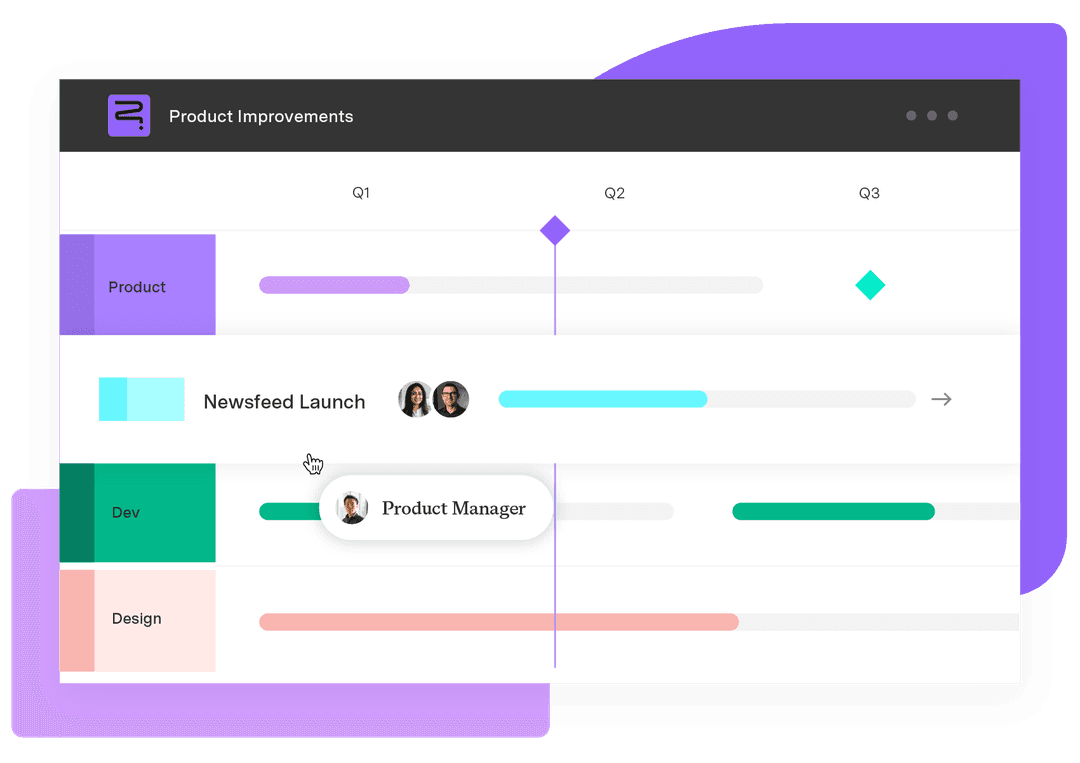Critical thinking skills: What they are and how to improve them
Tempo Team
Critical thinking skills don’t always come naturally. People often react to situations without considering all the options, especially when under pressure. However, the ability to slow down and think critically is vital for solving problems and making better decisions.
Critical thinking is about analyzing and evaluating information in a structured way. Whether you’re managing a project, leading a team, or tackling personal decisions, critical thinking skills can improve collaboration and drive innovation.
It’s easy to become a better decision-maker and problem-solver; you just need a little practice. Here, we’ll define critical thinking skills, explain their importance, and identify methods to develop them.
What are critical thinking skills?
Critical thinking involves analyzing information, spotting weak arguments, and questioning assumptions. It helps people draw logical conclusions based on objective evidence rather than gut feelings or popular opinions. Simply put, it’s the difference between reacting and reasoning.
Professionals with strong critical thinking skills don’t jump to conclusions or judge things at face value. Instead, they remain curious, engage with diverse perspectives, and evaluate ideas with an open (but discerning) mind.
Learning how to develop critical thinking skills requires you to practice slowing down, reflecting, and being intentional with your judgment. Developing your critical thinking skills will help you confidently navigate complexity, whether you’re leading a team or simply trying to make better decisions.
Why is critical thinking important?
Critical thinking helps you analyze, evaluate, and synthesize information to make solid, well-reasoned decisions. When applied consistently, it becomes a game-changer both individually and across teams. Here’s a closer look at the importance of critical thinking in the workplace:
Supports better decision-making
A significant benefit of critical thinking is its power to sharpen your judgment. By strengthening your ability to think critically, you’re better equipped to make clear, informed choices.
Wise decisions come from a thoughtful, structured process that evaluates evidence, considers multiple perspectives, and filters out cognitive biases. Critical thinkers ask questions: What are my assumptions? What are the consequences of this choice? Is there a better alternative I haven’t considered?
Reduces errors and minimizes risk
Mistakes are more likely when people rely solely on past experiences or snap judgments. Cognitive biases and emotional reasoning can lead to flawed outcomes. In contrast, critical thinking and problem-solving skills help you slow down your thought process to spot weak points in your reasoning, challenge flawed assumptions, and avoid repeating costly errors.
Enhances leadership and prioritization
Strong leadership requires sound judgment. Leaders must weigh trade-offs to guide their teams through complex challenges. Whether you’re deciding how to prioritize tasks or manage change, critical thinking helps you consider every angle and move forward confidently. It’s also crucial for spotting red flags others might miss.
Encourages professional growth
If you want to become a great leader or sharpen your project management skills, start with your thinking.
Critical thinkers stand out. They ask better questions and bring more value to their teams. In dynamic environments, the ability to think critically is one of the most in-demand and transferable skills you can build.
How to build critical thinking skills
You don’t have to be born a philosopher to think critically. It’s a skill you can sharpen with intention and practice. Here are methods to strengthen your critical thinking skills over time:
Ask incisive questions
Most people are hard-wired to seek answers, but critical thinking starts by asking the right questions. Instead of accepting information at face value, get curious.
What assumptions are being made?
What’s the source of this data?
What’s another way to look at this?
These thoughtful, open-ended questions uncover hidden biases and lead to more informed decisions.
Practice active listening
Listening is about more than simply thinking of a way to respond. Listen to understand; that’s where real growth happens. Critical thinkers make space to hear different perspectives, even when those ideas challenge their beliefs.
Try this in your next team meeting or client call: Focus fully, don’t interrupt, and summarize what you heard before responding. You’ll gather better insights, reduce cognitive biases, and strengthen collaboration.
Analyze case studies or past decisions
Hindsight is an excellent teacher. Take time to review past projects or company decisions, especially ones that failed or didn’t go as planned. This reflection helps you recognize patterns and sharpen your judgment moving forward.
Embrace diverse viewpoints
Intellectual echo chambers feel safe, but they limit your thinking. Actively seek out people with different opinions or problem-solving styles to challenge your assumptions and expand your mental range.
Slow down during key decisions
There’s a time for urgency and a time to pause. Critical thinking means knowing when to hit the brakes and take a deeper look. Before jumping into a pivotal decision, consider the following:
What evidence do I have?
What are the potential risks?
What might I be overlooking?
Pausing to evaluate your options helps you spot flaws in your logic and avoid reactive choices.
Reflect regularly
Want to improve your thought process? Start by practicing mindfulness. A daily or weekly reflection (e.g., journaling, voice notes, or even a quick walk-and-think session) helps you recognize when you’re jumping to conclusions or letting biases guide your actions.
Engage in thoughtful discussions
Sharing your ideas is the best way to test them. Conversations with trusted peers or mentors can reveal gaps in your arguments, challenge your assumptions, and sharpen your ability to articulate ideas.
5 critical thinking skills examples
Here are some essential critical thinking skills, plus examples to illustrate how they apply in the workplace.
1. Identification of biases
Think about a time when you were convinced you had an ideal, evidence-backed solution, only to discover that you overlooked contradictory information. Maybe you were so focused on the supporting arguments that you didn’t step back to consider other perspectives. This is an example of confirmation bias, where we favor information that confirms our preexisting beliefs.
A strong critical thinker is aware of these biases and works to identify them before making a decision. For instance, when evaluating a project proposal, they might ask, “Am I only focusing on what I like about this idea, or am I considering all potential risks?”
2. Analytical reasoning
Imagine an exec is analyzing company sales data from the previous quarter. Instead of focusing on the totals, they break it down: What products performed well? What regions saw the most growth? Were there any seasonal trends?
A critical thinker examines the details to identify patterns and make informed recommendations. In this case, the analysis might reveal that certain regions saw an uptick in holiday sales, suggesting the potential for a targeted marketing campaign next year.
3. Logical thinking
A project manager is working on a tight deadline, and a bottleneck is delaying progress. Rather than jumping straight to a solution, they take time to assess the situation logically: What’s causing the delay? Is it the software? The team’s workload?
Critical thinkers organize their thoughts and approach problems step-by-step, using logic to determine the most efficient action. This ensures they notice key details and develop the best possible solution.
4. Problem-solving
A team leader at a marketing firm notices their latest campaign isn’t performing as expected. Instead of panicking or placing blame, they focus on problem-solving. They review the campaign data and run tests, discovering that the issue lies in the targeting strategy.
Critical thinkers don’t shy away from problems. They face them head-on, carefully analyzing the situation and finding the best way forward so they can quickly adjust tactics.
5. Open-minded thinking
A manager is running a brainstorming session with their team when someone offers an idea that seems completely off the wall. Rather than dismissing it right away, the manager listens and asks questions to better understand the employee’s point of view.
Critical thinkers are open-minded. They know that hearing different perspectives that challenge their beliefs can lead to better decisions. A wild idea may spark a new direction for a project that no one had previously considered.
Support smarter thinking and decision-making with Tempo
Tempo’s Jira-native tools provide a framework that fosters critical thinking at every stage to encourage informed decisions and drive project success. Whether you’re strategizing or evaluating ongoing initiatives, Tempo provides essential data and insights.
Strategic Roadmaps provides a clear visual of your project’s trajectory, helping you allocate resources and track progress. It also promotes a mindset of critical evaluation and careful decision-making. Meanwhile, Idea Manager allows teams to logically organize, analyze, and prioritize solutions for maximum impact.
Ready to see how Tempo can empower your team to think critically and deliver exceptional results? Try Tempo today and enable better, more informed decisions.













































